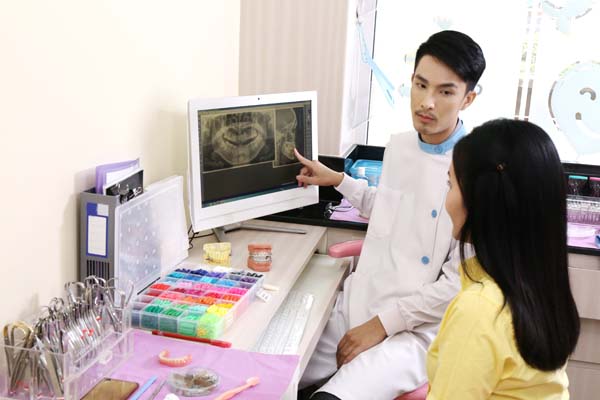General Dentistry: Are Digital Dental X-rays Recommended?

Traditional dental X-rays, which have been around for over 100 years, have played an important role in general dentistry. However, digital alternatives are becoming a popular choice among dentists. Digital X-rays are a more recent innovation; they were first developed in the 1980s, but their widespread implementation did not begin until the 1990s. Today, many experts recommend digital imaging because of its numerous advantages over traditional X-rays.
What are digital dental X-rays?
Digital X-rays are important for detecting oral health issues that cannot be seen by the naked eye. To a patient, the process looks and feels similar to traditional X-rays but what is happening behind the scenes is quite different.
The process
When a digital X-ray is performed, a small sensor is placed inside the patient's mouth. Sometimes an electronic scanner may be used as well. Digital images of the teeth and jaw are captured and sent immediately to a computer for evaluation.
The benefits
Digital X-rays offer a host of perks for patients and dental professionals. For starters, digital X-rays expose people to 90% less radiation than the traditional option, making them significantly safer for everyone involved. The results are also more precise with sharper imaging; computer programming allows the dentist to enlarge or enhance that image for a more thorough diagnosis.
Because the images are automatically created as digital files, saving and emailing X-rays for patient records and referrals is simple and helps eliminate the need for additional imaging. Certain computer programs can also be used to detect changes in a patient's X-rays over time. This allows general dentistry professionals to catch and treat problems early on before complications develop.
Traditional X-rays require the use of film to develop the captured images. Digital X-rays are sent straight to a computer, eliminating this step altogether. In addition to reducing waste and minimizing the negative effects on the environment, this also ensures a faster turnaround, which can mean less time spent waiting in the dental office.
When should digital X-rays be used?
While the dosage is significantly lower with digital machines, radiation exposure is still an important factor in determining how often dental X-rays should be taken. In children, the FDA recommends X-rays only be used for the monitoring and treatment of existing dental issues or if a child is considered high-risk for dental problems. In fully developed adults, once a year is considered both safe and beneficial.
Patients with a history of excellent oral health may not need digital X-rays on a yearly basis. A dentist may recommend fewer X-rays unless changes in health occur or new risk factors develop. Regardless of oral health history, dental X-rays should not be performed on pregnant women unless an emergency arises.
Radiation exposure makes some people wary of X-rays. However, the dosage is so low with digital imaging that the benefits far outweigh the small risks. Dental X-rays help detect decay, tumors, bone loss, and infection below the surface of the teeth and gums. Early detection before symptoms arise usually leads to a better treatment outcome and can even be life-saving.
What else should you know about digital dental X-rays?
You may have many questions about digital dental X-rays, especially if it has been a while since your last check-up. Here are some things patients frequently want to know.
Do digital dental X-rays hurt?
Digital dental X-rays can be awkward and uncomfortable, but they should not hurt. If you have a sensitive gag reflex, taking dental X-rays of any type may trigger it. However, there are things that can lessen the effects, so you might want to mention your concerns to your dental technician prior to the X-rays.
What specific problems do digital dental X-rays detect?
X-rays can detect tooth decay that may not yet be detectable by the naked eye because it is in its early stages. They can identify decay beneath fillings and in areas between the teeth.
An infection of the tooth can cause an abscess or changes in the bone. These are detectable with X-rays whereas they may not be otherwise.
X-rays can detect bone loss due to gum disease as well as some types of tumors or cysts. When a dental procedure is necessary, X-rays are important to the planning process.
Conclusion
Dental X-rays play a key role in general dentistry. Most professionals recommend digital X-rays for patients as a better alternative for both continued dental treatment and preventative care.
Request an appointment here: https://www.drelloway.com or call Randal S. Elloway DDS, Inc at 5305276777 for an appointment in our Red Bluff office.
Check out what others are saying about our services on Yelp: Read our Yelp reviews.
Related Posts
People often have wisdom teeth extraction performed when these teeth come in behind the second molars of the upper and lower jaw. Wisdom teeth appear between the ages of 17-25 and may crowd the other teeth, causing pain and possibly changing the bite of the teeth. Those who undergo an extraction often have questions about…
There are numerous reasons why dental professionals recommend wisdom teeth extraction, and one is to prevent teeth misalignment. Wisdom teeth are the third molars located in the lower and upper parts of the jaw, behind the other molars on both sides. The teeth generally appear years after the other permanent teeth have come up. In…
If your wisdom teeth have begun to emerge, it is time to speak to your dentist. When these teeth are impacted, they can have some serious effects on your oral health. It is important for you to understand the risks these teeth pose and the steps you should take. Your dentist can walk you through…
When you reach your 20s, wisdom teeth should emerge. This third set of molars come in at the back of the mouth. You will likely have two of these teeth on the top and bottom, though some people have fewer than four. Commonly, dentists recommend getting these removed, and it is not difficult to see…


